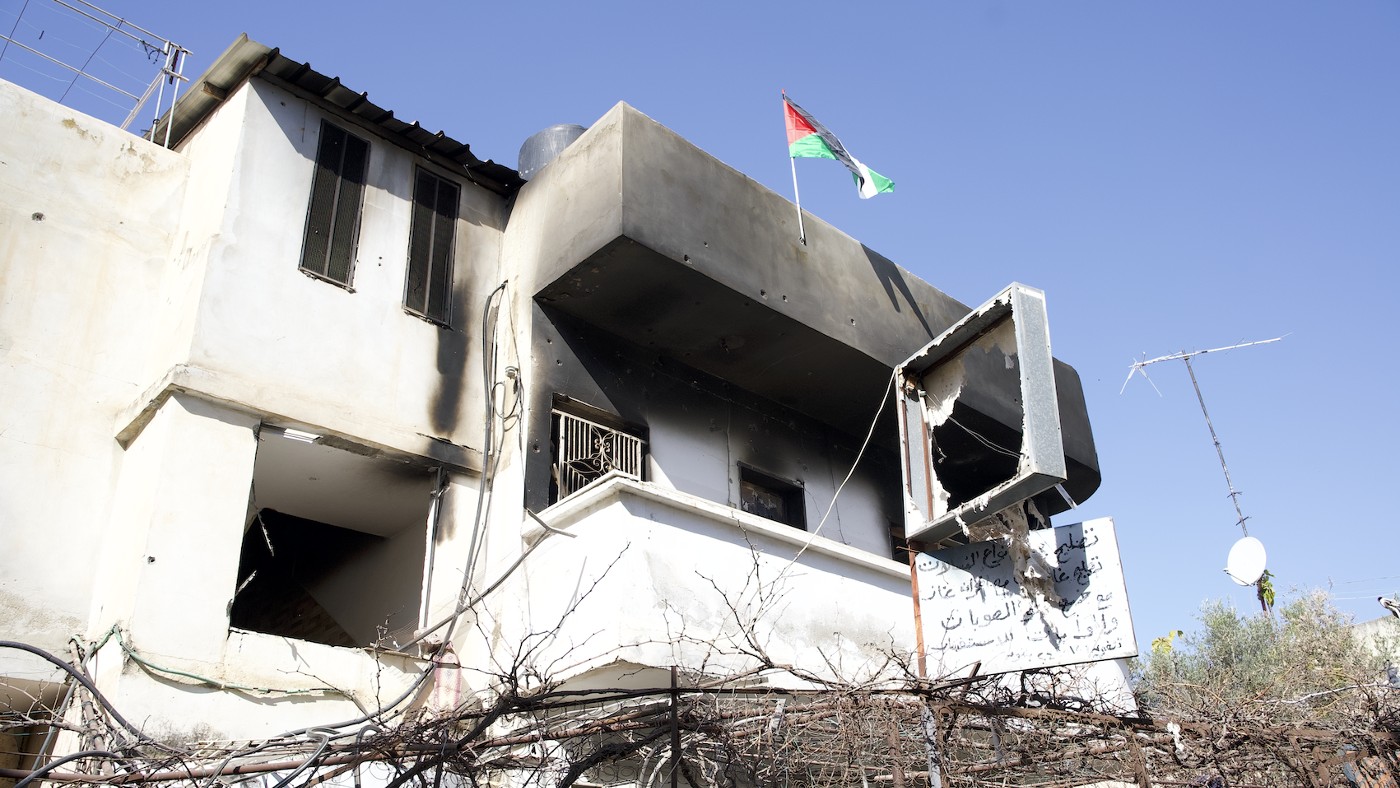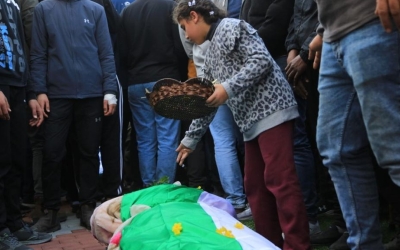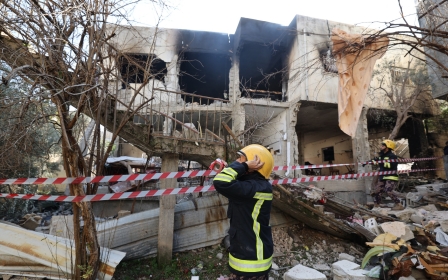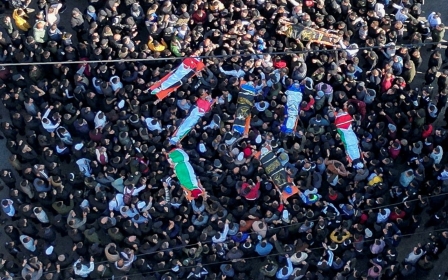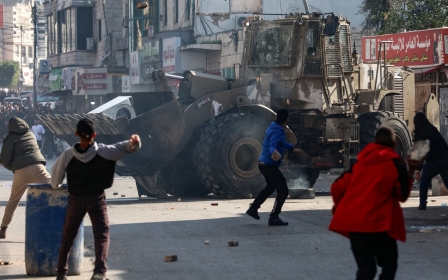Jenin's bereaved residents left in a 'war zone' following Israeli raid
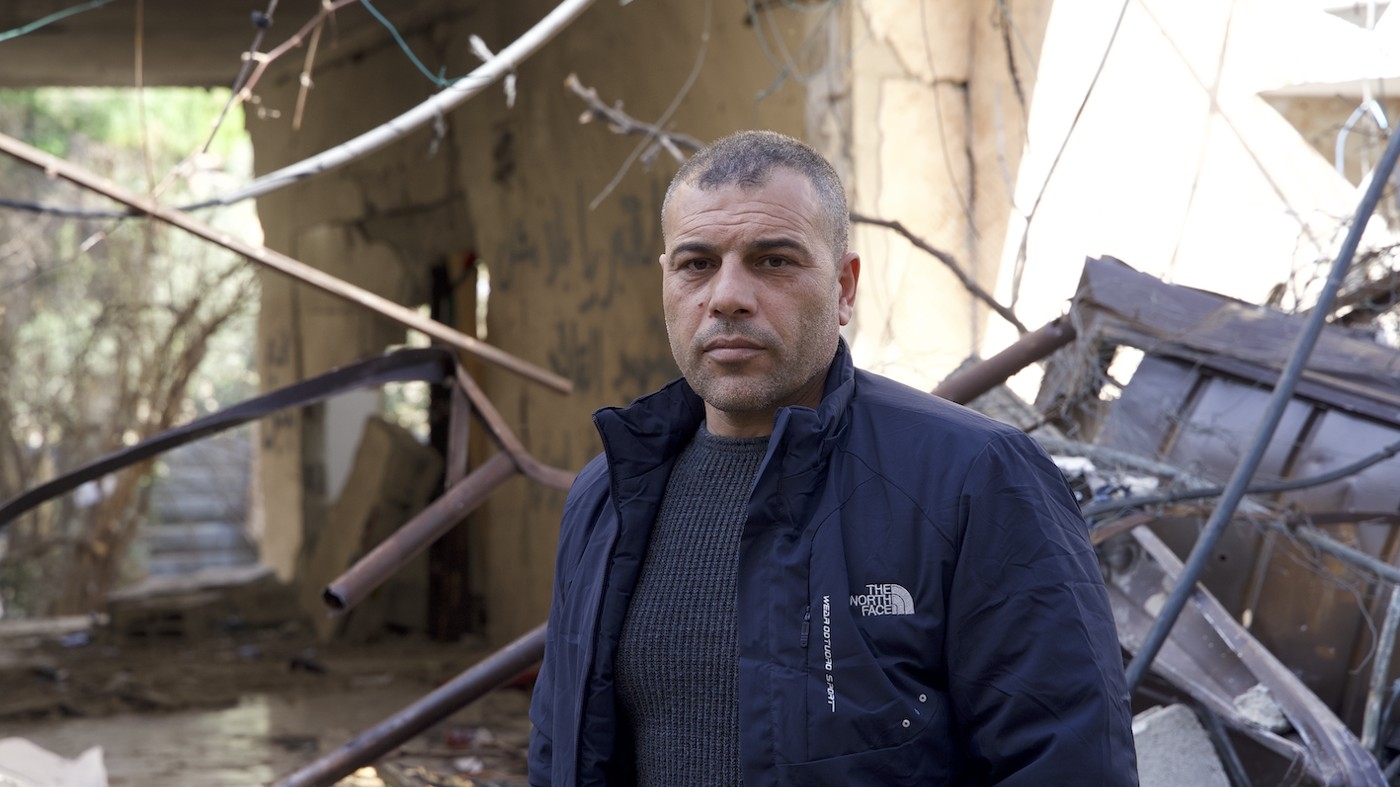
The last time Arwa Mousa saw her 18-year-old son alive was Thursday morning, just before he rushed out of their house in the Jenin refugee camp.
At 7am on the 26 January, Abdullah Mousa heard gunshots ringing through the camp. He leapt out of bed, rushing out the front door to “defend” the camp from what would become the deadliest Israeli army raid to take place in the West Bank in years.
But Abdullah never came home. His mother has not slept since he was killed. “I just stay up all night praying for him. All I can do is pray,” Arwa told Middle East Eye.
'He's watched his friends die. He grew up in this camp, seeing violent attacks on Palestinians every day. It took over his life'
- Arwa Mousa, mother of slain Palestinian
After Israeli armed forces shot her son, she said, he was left bleeding on the floor for an hour and a half, as the soldiers blocked off all entrances and entrances to the camp, preventing medics from treating the wounded.
“It should have only taken two minutes to get him to the hospital,” she said. "Every day there are martyrs on top of martyrs. They don't show mercy to anything. Not to the elderly, the young, the trees, the houses, nothing," she continued.
New MEE newsletter: Jerusalem Dispatch
Sign up to get the latest insights and analysis on Israel-Palestine, alongside Turkey Unpacked and other MEE newsletters
Between prayers for her son, Arwa said that Abdullah always knew he would end up a “martyr”, and that growing up surrounded by so much pain and death inflicted by Israel's occupation had “consumed him”.
"He's watched his friends die. He grew up in this camp, seeing violent attacks on Palestinians every day. It took over his life. He didn't want to study or work. He didn't want to have a house and get married," she said. “He just cared about resisting.”
Warzone
Israeli forces shot dead nine Palestinians during Thursday morning's large-scale assault on Jenin camp. A 10th Palestinian was shot dead later that day near al-Ram, north of Jerusalem.
'Who is the terrorist? The one who invades people's homes in an army and attacks them'
- Jenin Brigades fighter
"Israel says they want peace but have made our homes a war zone. How can we live in peace when you are not even safe in your own home," said a Palestinian fighter with the Jenin Brigades, a group of armed resistance fighters in the camp affiliated with the Palestinian Islamic Jihad movement.
“Yes, we are resistance fighters fighting against them, but they also target unarmed civilians, as we saw the day before,” he continued, referring to the killing of 61-year-old Majida Obaid, who was shot while sitting and reading the Quran inside her home.
Standing in a layer of wet mud on the street, staring at the charred remains of his house that once belonged to his brother, Mohammad al-Sabbagh, head of the popular committee for providing services in the camp, described his home that morning as a "warzone".
The day before, the hills of Jenin camp were coated in oil, a tactic used to slow down invading Israeli forces. Today, the mud is soaking up the oil so the locals can drive safely.
"It was a real massacre. There were injuries everywhere in the camp, and ambulances were not allowed to reach them," al-Sabbagh said.
He told MEE that his house was one of the two houses the Israeli soldiers stormed, firing rockets and explosives at it without warning. When he returned to the house he found "three dead resistance fighters".
Symbol of resistance
Jenin refugee camp became a symbol of Palestinian resistance after a deadly large-scale raid conducted by the Israeli army in 2002, during the Second Intifada.
It resulted in 53 Palestinians being killed, including Mohammad al-Sabbagh’s brother, many civilians, and 23 Israeli soldiers. Many residents of the camp say that the events of Thursday morning echoed the raid 21 years ago.
On Friday afternoon, despite the grave tragedy just 24 hours before, many locals said they were starting to feel numb to the death and destruction surrounding them. They explained that this was because fatal Israeli raids are common here.
"Every time [Israeli soldiers] come into the camp; they kill people. No one else would be able to deal with what we have to deal with," Arwa, Abdullah’s mother, said, adding that she thought the situation was only going to get worse. "It's not going to stop," she said.
Similarly, al-Sabbagh spoke almost casually about the high number of fatalities, arrests and demolitions Palestinians in Jenin are subjected to by Israeli forces. His brother Alaa was a resistance fighter in Jenin killed by an Israeli helicopter missile in 2002 during the Second Intifada.
He explained that “every single household” in Jenin refugee camp has been affected by the occupation. Every house has a martyr or a political prisoner or experiences a demolition.
"They are defending their rights, their homes, their families. The martyrs did not go to Tel Aviv to resist. The soldiers came to this camp, to their homes," he said, still standing between the debris of his house.
'They come to our homes to kill us for no reason. They are the occupiers. They are not defending themselves'
- Mohammad al-Sabagh, Jenin people's committee
After nightfall in Jenin, many young men walked through the streets carrying guns. The same masked resistance fighter from the Jenin Brigades told MEE that, contrary to Israeli narratives, he and the fighters were not terrorists.
"Armed resistance is one of the only choices left for people here. When occupation forces come into our camp, they come in with guns. So we defend ourselves with guns," he said.
"Who is the terrorist? The one who invades people's homes in an army and attacks them. We are defending ourselves, our land, our people and our homes under occupation.”
“They come to our homes to kill us for no reason. They are the occupiers. They are not defending themselves as they say. This is not their homeland to defend. It is ours,“ he told MEE.
Cycle of violence
Following Thursday's raid on Jenin camp, a Palestinian gunman killed seven Israelis in occupied East Jerusalem before being shot dead by Israeli police.
Less than 24 hours later, another shooting occurred at a settlement in the Silwan neighborhood in occupied East Jerusalem, injuring two Israeli settlers. The alleged shooter was a 13-year-old Palestinian boy.
In 2022, the deadliest year for Palestinians living in the West Bank in decades, 173 Palestinians were killed by Israeli forces, and approximately 34 percent of them came from Jenin.
Since the beginning of 2023, according to the Palestinian health ministry, 35 Palestinians have been killed by Israeli forces, more fatalities than in the first three months of 2022.
Al-Sabbagh says the international community needs to start looking at the reasons "that motivate an entire generation to seek death" before they call Palestinian resistance terrorism.
"Resistance [to the occupation] is a natural reaction to what is happening in Palestine. Kids here are frustrated, we have been here [in the refugee camp] for four generations, and there is no hope for their future. They are not allowed to live normal lives and reach for their dreams," he said.
Armed resistance has been resurging throughout the West Bank. Meanwhile, Israel has been attempting to quash the growing pockets of resistance, which are mainly concentrated within Jenin and Nablus.
The masked resistance fighter believes the phenomenon is growing because it is "like a tree".
“Even if you pick off the leaves, the roots still grow. With every leaf that you take off, a hundred more will grow in its place. So even if they create one martyr, there will be 100 more to take his place,” he told MEE, as groups of other armed young men walked past him.
“Everywhere in the West Bank, there are martyrs, so armed resistance is growing,” he continued.
Abdullah’s mother says that as the world continues to turn a blind eye to the suffering of the people in the Jenin refugee camp, and the rest of Palestine, the situation will only continue to worsen.
"If the world could only feel what we feel, what would you do if it was your kids? But instead of standing with us, everyone is standing with our enemy. We are standing alone," Arwa said.
Her parting words hung in the air. "That's why our children are forced to resist by themselves. Only God is with us."
Middle East Eye delivers independent and unrivalled coverage and analysis of the Middle East, North Africa and beyond. To learn more about republishing this content and the associated fees, please fill out this form. More about MEE can be found here.


